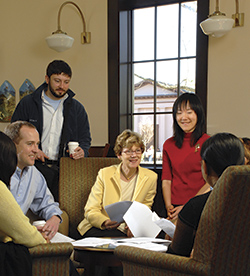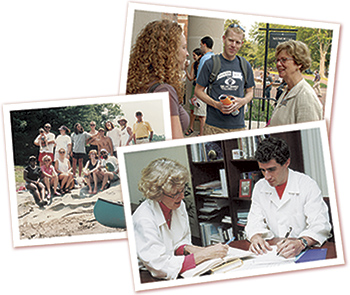A Dedicated Steward
Linda Dykstra leads era of innovation

Since becoming the Graduate School’s first woman dean in 1996, Linda Dykstra has tirelessly developed programs, increased funds and improved forms of recognition for graduate students.
For over 150 years, graduate education at the University of North Carolina at Chapel Hill has been marked by constant expansion and progress thanks to devoted leaders who have responded to the challenges of their times. At the end of the 2007-08 academic year, Linda A. Dykstra will have ushered the Graduate School through one of the most successful periods in its history.
Dykstra, who came to Carolina after earning a doctorate in psychopharmacology from the University of Chicago, has led an active research program at the University since 1972. Among other things, her laboratory’s work has been instrumental in developing drugs that can treat opiate dependence. It was her experiences with graduate students in her lab along with her involvement with the Graduate School’s Administrative Board that motivated her desire to become the dean of the Graduate School in 1996.
“The idea of taking on an administrative position that would give me the chance to advocate for graduate students was incredibly appealing,” Dykstra says. “And as a faculty member of the Administrative Board, I had seen some of the opportunities that were available here at Carolina to expand our understanding of what graduate students do and how much they contribute to the University.”
Dykstra says her greatest challenges when she became dean were to place graduate education on the agenda of upper administration, to add academic and financial resources to recruit graduate students of the highest quality and to develop an effective initiative for private funding to provide needed resources to students. Those challenges were met and exceeded through a diverse array of initiatives.
“It has taken almost the full time I’ve been here as dean to insert issues related to graduate education on the agenda of the Board of Trustees,” Dykstra says. “And now we are happy that we have a board of trustees that is asking for more information about graduate students and helping us come up with innovative ways to support them.”
Among the most visible ways in which the Graduate School has shown its support of students has been a new Graduate Student Center, a special hooding ceremony to recognize doctoral candidates during commencement and the Graduate Student Recognition Event.

Dean Linda Dykstra’s experiences with students in the lab, and outside the lab, provided her knowledge of the academic and personal needs of graduate students. She has helped Carolina’s graduate students gain health insurance, increased stipends and parental leave.
“The Graduate Student Recognition Event is a way in which we showcase the accomplishments of graduate students to the entire University community,” Dykstra says. “The idea for this started years ago when we wanted to recognize the many graduate students who have competed nationally on their own for very prestigious fellowships. Since then we’ve expanded this to recognize and thank our students for their many accomplishments.”
Along with such forms of recognition, Dykstra’s efforts to improve graduate student life have been instrumental in attracting talented students to Carolina. The Graduate School-initiated American Indian Research Conference has helped increase student-population diversity, while programs like student mentoring, professional training, parental leave and increased stipends have improved their quality of life.
“We recognized early on that graduate students needed health insurance in addition to more competitive stipends for teaching and research assistants (TAs and RAs), so we’ve done that,” she says. “We’ve also recently introduced a program of parental leave for TAs and RAs and are always looking for ways to improve the environment for graduate students on a personal as well as an academic level.”
All the Graduate School’s initiatives over the past 12 years would not have been possible, however, without the consistent funding of dedicated donors. Major programs like the Royster Society of Fellows and the Weiss Fellows, along with other individually endowed fellowships have provided students with the ability to concentrate fully on their research and gain unique interdisciplinary experiences.
“In order to get philanthropic individuals interested at the grassroots level, we had to create visible programs that they could support,” Dykstra says. “We created the Scholars for Tomorrow program, we created the Impact Awards, we created dissertation fellowships and five-year fellowships and we created a student-opportunity fund. So there were a whole series of ways in which people could give to graduate education in proportion to their ability and desire to give.”
Dykstra’s commitment to funding at the Graduate School will continue through the newly endowed Graduate Dean’s Distinguished Dissertation Award that Dykstra has created with her own personal gift. She says that it will be up to the next dean to continue to advocate for financial support through a range of initiatives to allow graduate students to focus on their training. As for her future at Carolina, Dykstra plans to continue doing what she does best.
“I will move across the street and just begin to think in an uninterrupted way about the direction in which I’d like to take research in our laboratory,” she says, “but I will always continue to teach and work with graduate students.” • Joshua D. Meyer


